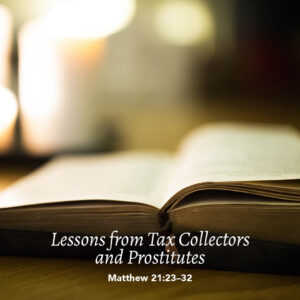Matthew 21:23-32: Lessons from Tax Collectors and Prostitutes
March 1, 2025
TODAY'S BIBLE READING:
Numbers 1-2; Psalm 48; Matthew 21:23-32; Romans 1:1-17

In religious circles, “authority” questions are nearly ubiquitous. Who is in charge is a political issue in many institutions and organizations, and the conflict that such questions can cause has been solved down through history through various political resolutions—in our modern Western age most prevalently through different forms of representative democracy of one kind or another.
Such political infighting and squabbling is not entirely, I am afraid, left to religious history either. But there is another element that is not political, but theological or epistemological: how do I know what God wants from me? Who is to say? Where is the “magisterium,” the locus of authority? The answer of the Protestant Reformation was that the authority is vested in Scripture, because it is in Scripture that the voice of God, and of Jesus, is clearly heard.
The chief priests and elders of the people (21:23) are the representatives of the authoritative structures around the temple religion of the time, and they are concerned that Jesus is overstepping his bounds, and infringing on their territory—if not the territory of God himself. So they ask him where his authority comes from. Jesus, wise as ever, turns the question on its head, and questions the presumption that he is overstepping his bounds, by asking them where they thought John the Baptist got his authority. This skewers them on the horns of a dilemma, for they are more concerned with the politics of the situation than with the truth (21:25-26). They lamely say “they don’t know,” which non-answer Jesus recognizes and therefore does not answer their question.
He then turns to teach, with a parable (21:28-32). One son (21:29) says that he will go and work in the vineyard but actually does not; the other says he will not go to work in the vineyard, but actually he does go and work in the vineyard. Who, the point then is, actually obeys the authority of his father? The answer, of course, is the one who actually did what his father said—even though originally he did not obey. Similarly, says Jesus, the religious outcasts, tax collectors, and prostitutes, who did not first of all look or sound as if they were obeying God, are actually pressing into the kingdom ahead of the chief priests and elders of the temple.
The lesson then is that we, as those who genuinely obey Jesus, are to follow him and recognize the authority of his word—and we are not to merely pretend to do so, while actually doing something else (as was the pattern of the chief priests at the time).
ABOUT THE AUTHOR
Josh Moody (Ph.D., University of Cambridge) is the senior pastor of College Church in Wheaton, IL., president and founder of God Centered Life Ministries, and author of several books including How the Bible Can Change Your Life and John 1-12 For You.
WANT MORE?
To receive God Centered Life devotionals directly in your inbox, as well as other resources, enter your email address in the form at the bottom of this page and click "subscribe."

